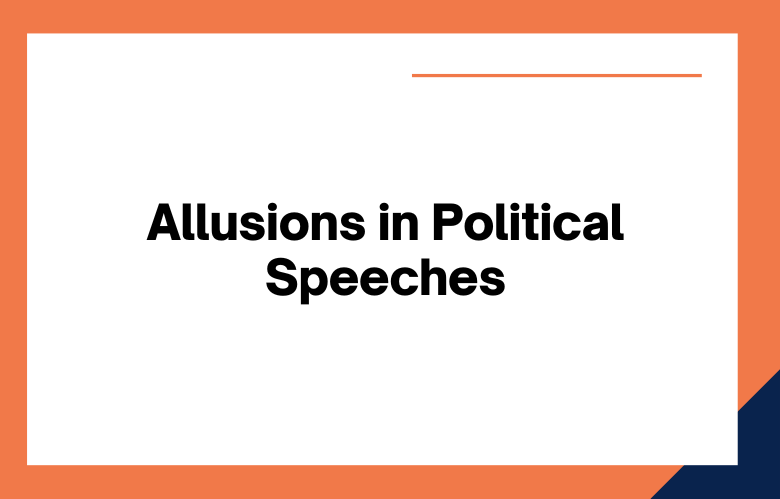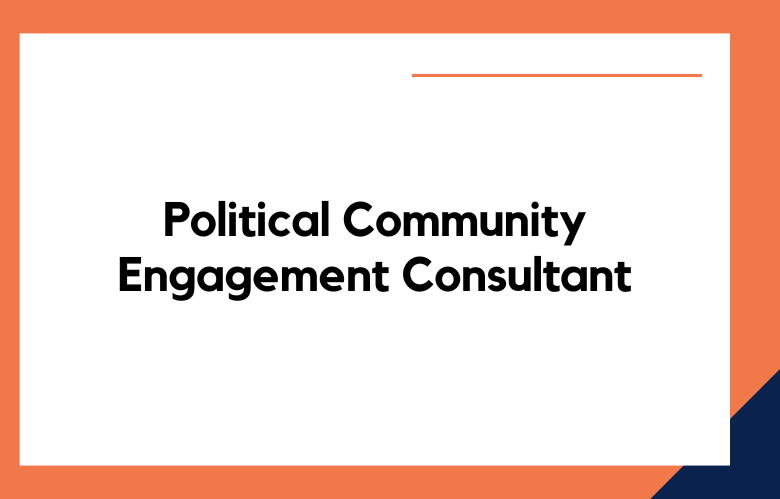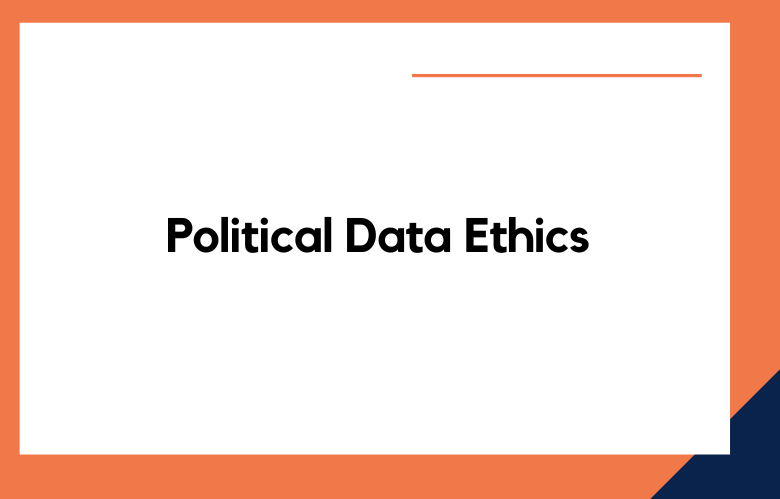Allusions are a powerful rhetorical device politicians use to connect with their audience. Allusions are references to people, places, events, or stories. They can capture an audience’s attention, make a point, or evoke an emotion. This article will examine how allusions are used in political speeches and why they are so effective.
What is an Allusion?
An allusion is an indirect reference made by a speaker to another person, place, or thing, either real or imaginary. An allusion can make a point without explicitly stating it.
For example, if anyone says, “It’s raining cats and dogs out there!” that person could be referring to the current weather as bad without actually saying so.
Allusions can also be used to compare two seemingly different things. They can help influence how people think about specific political issues or policies.
What is the impact of allusions on political speeches?
Allusions are an essential tool for political speakers. They allow a speaker to tap into their audience’s collective consciousness and create a more powerful emotional connection between speaker and listener.
But what kind of impact do allusions have on political speeches? Let’s take a look.
What are Allusions?
An allusion is an apparent reference to a person, place, event, or story familiar to the audience.
The power of an allusion lies in its ability to help the speaker connect with the audience on a deeper level than simply providing facts and figures would allow.
By invoking something already known by the audience—whether from history, literature, or film—the speaker can appeal to their emotions more quickly than if he had just presented them with cold, hard facts alone.
How do Politicians use Allusions?
Politicians often use allusions in their speeches to connect with their constituents.
For example, you’re running for office and want to discuss your commitment to public safety. You could recite statistics about crime rates in your city, but that might not have much impact on your listeners.
However, suppose you invoke an image of courageous firefighters putting out a burning building to illustrate your commitment to public safety. In that case, your words will likely resonate more deeply with your audience.
This is because you’ve taken something they already know—in this case, the image of firefighters battling fires—and used it to illustrate your point.
Moreover, politicians also use allusions to evoke a particular emotion from their audience.
For instance, during his 2020 presidential campaign, Joe Biden recalled Franklin D Roosevelt’s famous “nothing-to-fear” speech when he declared,
We have nothing we should fear but fear itself” during his 2020 acceptance speech for the presidential nomination at the Democratic National Convention.
This was meant as an uplifting message and invocation of hope, which FDR famously declared during his inaugural address in 1933, during one of America’s darkest moments during the Great Depression.
By invoking FDR’s words, Biden conjured up those same feelings in his listeners nearly 90 years later despite being separated by time and circumstance.
The Power of Allusions
Allusions are references to literary, historical, or cultural events that can evoke an emotional response from an audience.
For example, in an address about the importance of education, a politician might refer to the famous lines from John F.
Kennedy’s speech at Rice University in 1962—”We choose to go to the moon in this decade and do the other things, not because they are easy but because they are hard.”
This allusion taps into the American public’s shared memory of JFK’s inspiring words and helps to strengthen the politician’s message about education.
The Impact on Political Speeches
Allusions have become so commonplace in political speeches that some may dismiss them as unimportant or irrelevant.
However, research shows that allusions can significantly impact how audiences perceive speeches.
In one study, researchers at Stanford University asked participants whether they thought political speeches were more effective when they included allusions than when they did not.
The results showed that those participants who heard speeches with allusions rated them significantly higher than those who heard similar speeches without any allusive language.
The Appeal of Allusions
Allusions can be used to evoke emotion in political speeches. By comparing one idea or person to another, politicians create a sense of nostalgia or familiarity with their audience.
This makes it easier for them to connect with the audience on a deeper level, as they use a language that people already understand and relate to.
For example, if a politician spoke about the current state of healthcare in America and compared it to “a house on fire,”
They would instantly gain an emotional connection from the audience, which they could then use to further an argument or point.
Limitations of Allusions
Despite the power of allusions, they come with some limitations that need to be considered when crafting a speech.
The most significant rule is that not everyone will understand the allusion and, therefore, won’t receive its intended meaning or message.
If an allusion needs to be clarified, the audience could misinterpret it, leading to confusion or even hostility toward the speaker’s point of view.
If an allusion is too obscure, it may fall flat with an audience who has yet to gain prior knowledge, undermining its effectiveness and taking away from other vital points in the speech.
Political Allusions and the Power of Language?
One of the most powerful tools for politicians is using allusions in their speeches.
Allusions are comparisons writers make between objects, people, or places to convey a deeper meaning. They can make an argument more vivid, create emotional appeal, and strengthen an idea.
Politicians rely on these techniques to get their points across and influence their audiences. Let’s explore how allusions help politicians achieve their goals.
Unpacking the Secret Meaning of Allusions in Political Speeches?
Allusions are a powerful rhetorical device often used in political speeches to convey meaning beyond the surface-level message.
They are references to literary, cultural, historical, or mythological figures, events, or texts intended to evoke a specific emotion or response in the audience. Unpacking the secret meaning of allusions in political speeches requires a deep understanding of the speaker’s intention, the context of the address, and the cultural references used.
For example, when former President Obama said, “Yes We Can!” in his 2008 presidential campaign, he was not just referring to his platform but also drawing on historical allusions to the civil rights and labor movements.
The phrase “Yes We Can!” was initially coined by the United Farm Workers during their successful fight for better wages and working conditions. Using this allusion, Obama could tap into the same spirit of social justice and grassroots activism that had driven previous movements for change.
How Political Allusions Influence an Audience – Examining The Impact?
Political allusions are frequently used in speeches, political advertisements, and other forms of political communication because they powerfully affect the audience.
Allusions can be defined as brief references to a known image or idea without a detailed explanation. They can convey complex thoughts and emotions concisely. In politics, allusions can evoke powerful images, stir emotions, or elicit particular views or beliefs from the audience.
One significant way political allusions influence an audience is by tapping into shared cultural experiences and knowledge. For instance, when a speaker alludes to a historical event, a famous person, or a pop culture phenomenon, they use shorthand for a complex set of ideas, emotions, or beliefs the audience is presumed to share.
This strategy can be particularly effective in mobilizing an audience or persuading them to adopt a particular viewpoint.
Investigating the Power of Allusions in Politics and Public Speaking?
Allusions have been a potent tool in politics and public speaking. Using references to historical events, famous speeches, and cultural touchstones can quickly and effectively evoke emotional responses in audiences.
By tapping into shared experiences, allusions can help speakers connect with their audience and build rapport.
Some of the most famous speeches in history have incorporated allusions. In his “I Have a Dream” speech, Martin Luther King Jr. alluded to the Emancipation Proclamation, the Declaration of Independence, and the Bible.
Barack Obama’s 2008 victory speech famously referenced the Gettysburg Address and allusions to the American Dream and the Civil Rights Movement. Ronald Reagan was also known for effectively using allusions and referencing cultural icons such as John Wayne to emphasize his vision of American values.
Decoding The Hidden Messages Behind Political Allusions (What You NEED To Know)?
Politics is undoubtedly one of the most complex and intriguing subjects of discussion in today’s world. It dictates our daily lives in more ways than we may even realize. Political leaders and their policies have far-reaching impacts on everything from our economy to our education system, social values, and even freedoms. However, politics can be overwhelming, especially for those unfamiliar with the nuances of political allusions.
Political allusions are references to events, people, or ideologies from the past or present that are used to imbue a speaker’s message with a specific connotation.
There are several reasons why leaders use allusions in their speeches, with the most apparent one being the subtlety it provides.
Utilizing allusions allows politicians to convey their message without directly mentioning it, giving them plausible deniability in the event of controversy.
Additionally, it allows politicians to tap into the deep-seated emotions and values associated with their allusions, which can inspire strong reactions from their supporters.
Revealing the Impacts of Using Allusions in Political Speeches?
Allusions are a powerful tool politicians wield to sway public opinion and gain support for their agenda.
By referencing famous works of literature, mythology, or historical events, politicians appeal to the emotions and values of their audience, tapping into shared cultural knowledge to create a sense of connection and resonance.
However, using allusions in political speeches can also have unintended consequences, revealing underlying biases, reinforcing social hierarchies, and obscuring the facts of a given situation.
One way in which allusions can impact political discourse is by reinforcing existing power dynamics.
For example, a politician who invokes references to Greek mythology or Shakespeare may be seen as more erudite and sophisticated than one who uses more everyday language, thereby positioning themselves as a member of an intellectual elite.
Similarly, allusions to Western culture can exclude non-Western audiences, reinforcing a sense of cultural domination and privilege.
Conclusion
Allusions are powerful tools politicians can use to connect with their audiences emotionally and intellectually.
They can illustrate points or evoke certain feelings among listeners, making them highly effective ways for politicians to convince voters or rally supporters around particular causes or issues.
Allusions remain popular rhetorical devices today, especially among speakers who need to make complex topics easier for non-specialists to grasp and understand.
Therefore, anyone wanting to understand grand-scale politics must fully appreciate how politicians use allusions to craft compelling narratives that serve their political agendas.
Call: +91 9848321284
Email: [email protected]











